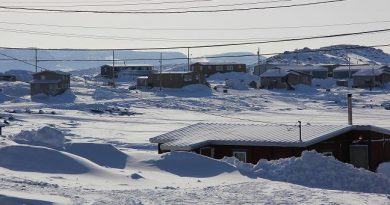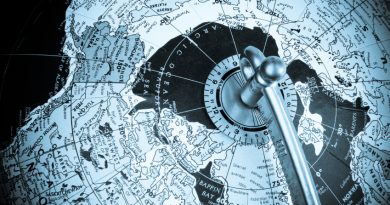No Representation Without Taxation: Good Governance in the North
 Last month, I wrote about the need to reduce dependency on federal transfers in northern Canada. A good point, I think, was made, but left behind the question of “how?” How can the aboriginal and territorial governments in northern Canada reduce dependency? At least one of the answers is taxing their own citizens more.
Last month, I wrote about the need to reduce dependency on federal transfers in northern Canada. A good point, I think, was made, but left behind the question of “how?” How can the aboriginal and territorial governments in northern Canada reduce dependency? At least one of the answers is taxing their own citizens more.
No one really likes to pay taxes. But almost everyone likes the services, infrastructure and law & order that is paid for by those taxes. And while paying taxes may leave individual taxpayers with less money, it creates societies that are much richer, benefiting all.
That is why you will see the countries with the highest taxes – our Nordic neighbours – as among the very richest, with the least inequality, the best health and the least crime and violence. For those in the Tea Party who would resist almost all taxation and government regulation, I suggest they move to Somalia and see how that works out.
Weighing the benefits
We can appreciate, then, the benefits that taxes bring. But something that has been overlooked in academia and public policy until very recently is that tax revenues are desirable not only for the services and infrastructure they pay for, but for the relationship of mutual reciprocity they engender between the state and its citizens.
In fact, this is how modern democracies were founded, from the English Civil War in the 17th Century that brought about the preeminence of Parliament, to the American Revolution and their insistence that there be no taxation without representation. States have taxed for much longer than that, but before the spread of democracy it was almost always coercive, and thus expensive, with high rates of tax evasion. When states and citizens negotiate how much to tax and what services those taxes will provide, the effect is rationalization of the tax process – making it predictable, consensual, and of mutual benefit. Taxes are not only spent – they are well spent.
Taxation and the North
What does all of this have to do with the North? A lot. Territorial and aboriginal governments in the North have sought – and in many cases received – more political autonomy in the past generation. They have assumed more control over the decision-making and delivery of local services and have done so based on mandates they receive through democratic elections. But – a big but – almost all of their revenue continues to come from federal transfers or natural resource rents.
Federal dollars and mining profits pay for roads and wages as well as local tax dollars would; but the consequence is that it distorts how the money is spent, and usually for the worse:
- Territorial and aboriginal governments are made accountable to the federal government, not to their citizens.
- There is much less political engagement and negotiation with citizens over how to spend the revenue, because it’s not coming from the citizens themselves.
- The situation leaves the federal government with an incentive to reduce services and territorial and aboriginal governments to provide more. The result is adversarial, with much less incentive to compromise as there would be between taxpayers and their elected representatives.
- Revenues from resource development are much more vulnerable to corruption and patronage, and are rarely spent as transparently as taxation revenue.
- Rentier states (those reliant on non-tax sources of revenue) generally have a disproportionately large public sector and a bloated public payroll. Among other things, this makes it difficult for small and medium businesses to compete with government in the services they can profit from and the wages they can offer their employees.
The challenges
Some likely objections to imposing, or simply collecting, more local taxes from northern Canadians include that they are too poor – that they don’t have extra money to pay in taxes. This assumes that they will lose out by paying taxes and will not benefit from the public goods and services those taxes will provide. The idea, of course, is that governments will spend citizen tax revenues much smarter than other sources of revenue, and that as citizens reap the benefits of those services, they will view the imposition as legitimate. It must also be said that much poorer societies, in the Global South, pay a much higher proportion of their income in taxes than is currently collected in the North.
Another objection, particularly among First Nations, is that local services and infrastructure are the federal government’s responsibility, and that they should not allow it to be shirked. However the government of Canada would/could never provide enough funding to bring reserves up to the living standard of other Canadian communities, perhaps because they are reneging on their responsibilities, but mostly because a system of dependency like that which exists can never support good governance and development. The First Nations Tax Commission, recognizing this, is working very hard to support First Nations in their capacity to collect local taxes for better local service provision, and with significant success, particularly in B.C., Yukon and Alberta.
At any rate, the lack of a tax culture is one of the biggest obstacles to implementing a more substantial tax regime in the North. My own, modest, recommendation would be to start small, with gas, alcohol, tobacco and sales taxes, and use the revenues for very visible local projects, such as playgrounds, recreation facilities, street lights and the like.
My dad used to remind us kids about his version of the Golden Rule when we got too demanding – “he who makes the gold, makes the rule.” And so it is – whoever provides the bulk of government revenues, be it businesses, resource companies, the federal government, or citizens, will be the ones to whom government responds, and the ones who hold government accountable. Centuries of experience have taught us that governments work best when that power rests in the hands of the people. Until taxpaying citizens are the primary source of government revenue in the north, governance, and well-being, will suffer.



